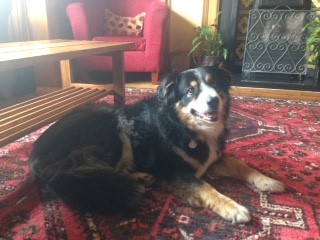Separated By A Common Language
16th July 2015Misunderstandings in communication - a blog inspired by my 8 year old daughter!
There is an adage that says that Britain and America are two nations divided by a common language.
I was reminded of this recently and of how it's not just nations who have the understanding of language separating them but individuals too.
Recently, our family dog, Ceilidh (pronounced Kaylee), had a stroke, collapsed and so was rushed to the vet. Accompanying her was my 8 year old daughter and her Dad. On the way Ceilidh had another attack and when our daughter asked her Dad if she was ok. My daughter saw the fear in his eyes and knew how serious it was. At the vets she also saw how alarmed the vet was and watched the emergency treatment so she could have been in no doubt as to how sick she was.
Here's a photo of Ceilidh looking fit and well after her ordeal!

Despite this when, amazingly, she was well enough to come home later in the day, our daughter would not leave her in peace. We kept telling her that Ceilidh was very ill and needed rest and calm to help her to recover but to no avail. My daughter was behaving very inappropriately as though nothing was wrong. She was fussing her, stepping over where she lay and generally making lots of noise. Ceilidh was still paralysed down the one side and in a pretty bad way and no matter how much we explained, we couldn't seem to change our daughter’s behaviour. It was really worrying us that she wasn’t behaving well. It was also very odd because our daughter adores Ceilidh and would do anything for her so we kept asking ourselves ‘why couldn't she manage this?’
Finally we got to the bottom of it. During the examination, to allay my daughters worst fears and to provide some form of explanation, the vet had described that her illness was like being "dizzy.” To my eight year old this has a very clear meaning. Ceilidh was fine, all that had happened was that she had chased her tail too much and got dizzy. It happens to kids all the time (the getting dizzy not the tail chasing) and is nothing to worry about so why should we make a fuss of her? My daughter reasoned that she didn't need time to get better - she had just been spinning round!
Once we clarified that the vet’s idea of dizzy and her idea were very different, her behaviour changed entirely. Finally she understood that Ceilidh was unwell and not just dizzy and so she behave accordingly. In this case, unintentionally, the vet’s language had got in the way of her understanding.
Language can often be like that. On the surface, words can seem very clear and like an iceberg, there are often huge amounts of meaning beneath the surface. This meaning is made of things like emotions and life experiences that colour the words and generate a deeper meaning.
In NLP we describe this with the expression "the map is not the territory". The models we make of the world around us with our brains and our language are not the world itself but are instead our own representations of the world. In this case my daughter’s internal representation of dizzy was entirely different to the vets!
Because we assume that others see the world as we do then we can often get into misunderstanding when we are communicating. Sometimes it does seem like we are speaking a different language. When we take the time to see things from someone else’s perspective and to understand their point of view we can get magical glimpses into another person’s reality and we can experience the world in another way.
I am so happy to tell you that Ceilidh is now fit and well and currently playing host to a gorgeous Labrador puppy called Beau that we are fostering for a while before she goes into her training to be a guide dog for the blind!!
Here' is a lovely photo of Beau snoozing with her Teddy, to brighten your day!!

Fiona xx



